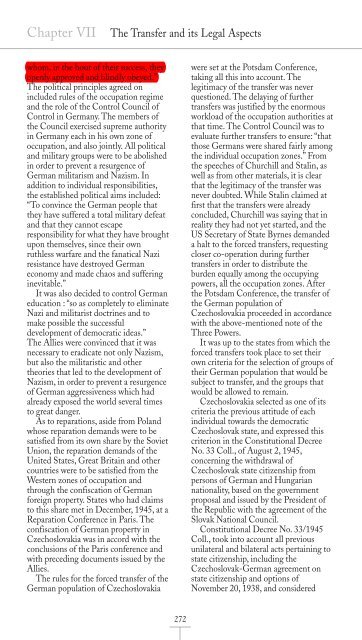the nationality of all inhabitants of the czech provinces and ...
the nationality of all inhabitants of the czech provinces and ...
the nationality of all inhabitants of the czech provinces and ...
You also want an ePaper? Increase the reach of your titles
YUMPU automatically turns print PDFs into web optimized ePapers that Google loves.
Chapter VII The Transfer <strong>and</strong> its Legal Aspects<br />
whom, in <strong>the</strong> hour <strong>of</strong> <strong>the</strong>ir success, <strong>the</strong>y<br />
openly approved <strong>and</strong> blindly obeyed.”<br />
The political principles agreed on<br />
included rules <strong>of</strong> <strong>the</strong> occupation regime<br />
<strong>and</strong> <strong>the</strong> role <strong>of</strong> <strong>the</strong> Control Council <strong>of</strong><br />
Control in Germany. The members <strong>of</strong><br />
<strong>the</strong> Council exercised supreme authority<br />
in Germany each in his own zone <strong>of</strong><br />
occupation, <strong>and</strong> also jointly. All political<br />
<strong>and</strong> military groups were to be abolished<br />
in order to prevent a resurgence <strong>of</strong><br />
German militarism <strong>and</strong> Nazism. In<br />
addition to individual responsibilities,<br />
<strong>the</strong> established political aims included:<br />
“To convince <strong>the</strong> German people that<br />
<strong>the</strong>y have suffered a total military defeat<br />
<strong>and</strong> that <strong>the</strong>y cannot escape<br />
responsibility for what <strong>the</strong>y have brought<br />
upon <strong>the</strong>mselves, since <strong>the</strong>ir own<br />
ruthless warfare <strong>and</strong> <strong>the</strong> fanatical Nazi<br />
resistance have destroyed German<br />
economy <strong>and</strong> made chaos <strong>and</strong> suffering<br />
inevitable.”<br />
It was also decided to control German<br />
education : “so as completely to eliminate<br />
Nazi <strong>and</strong> militarist doctrines <strong>and</strong> to<br />
make possible <strong>the</strong> successful<br />
development <strong>of</strong> democratic ideas.”<br />
The Allies were convinced that it was<br />
necessary to eradicate not only Nazism,<br />
but also <strong>the</strong> militaristic <strong>and</strong> o<strong>the</strong>r<br />
<strong>the</strong>ories that led to <strong>the</strong> development <strong>of</strong><br />
Nazism, in order to prevent a resurgence<br />
<strong>of</strong> German aggressiveness which had<br />
already exposed <strong>the</strong> world several times<br />
to great danger.<br />
As to reparations, aside from Pol<strong>and</strong><br />
whose reparation dem<strong>and</strong>s were to be<br />
satisfied from its own share by <strong>the</strong> Soviet<br />
Union, <strong>the</strong> reparation dem<strong>and</strong>s <strong>of</strong> <strong>the</strong><br />
United States, Great Britain <strong>and</strong> o<strong>the</strong>r<br />
countries were to be satisfied from <strong>the</strong><br />
Western zones <strong>of</strong> occupation <strong>and</strong><br />
through <strong>the</strong> confiscation <strong>of</strong> German<br />
foreign property. States who had claims<br />
to this share met in December, 1945, at a<br />
Reparation Conference in Paris. The<br />
confiscation <strong>of</strong> German property in<br />
Czechoslovakia was in accord with <strong>the</strong><br />
conclusions <strong>of</strong> <strong>the</strong> Paris conference <strong>and</strong><br />
with preceding documents issued by <strong>the</strong><br />
Allies.<br />
The rules for <strong>the</strong> forced transfer <strong>of</strong> <strong>the</strong><br />
German population <strong>of</strong> Czechoslovakia<br />
272<br />
were set at <strong>the</strong> Potsdam Conference,<br />
taking <strong>all</strong> this into account. The<br />
legitimacy <strong>of</strong> <strong>the</strong> transfer was never<br />
questioned. The delaying <strong>of</strong> fur<strong>the</strong>r<br />
transfers was justified by <strong>the</strong> enormous<br />
workload <strong>of</strong> <strong>the</strong> occupation authorities at<br />
that time. The Control Council was to<br />
evaluate fur<strong>the</strong>r transfers to ensure: “that<br />
those Germans were shared fairly among<br />
<strong>the</strong> individual occupation zones.” From<br />
<strong>the</strong> speeches <strong>of</strong> Churchill <strong>and</strong> Stalin, as<br />
well as from o<strong>the</strong>r materials, it is clear<br />
that <strong>the</strong> legitimacy <strong>of</strong> <strong>the</strong> transfer was<br />
never doubted. While Stalin claimed at<br />
first that <strong>the</strong> transfers were already<br />
concluded, Churchill was saying that in<br />
reality <strong>the</strong>y had not yet started, <strong>and</strong> <strong>the</strong><br />
US Secretary <strong>of</strong> State Byrnes dem<strong>and</strong>ed<br />
a halt to <strong>the</strong> forced transfers, requesting<br />
closer co-operation during fur<strong>the</strong>r<br />
transfers in order to distribute <strong>the</strong><br />
burden equ<strong>all</strong>y among <strong>the</strong> occupying<br />
powers, <strong>all</strong> <strong>the</strong> occupation zones. After<br />
<strong>the</strong> Potsdam Conference, <strong>the</strong> transfer <strong>of</strong><br />
<strong>the</strong> German population <strong>of</strong><br />
Czechoslovakia proceeded in accordance<br />
with <strong>the</strong> above-mentioned note <strong>of</strong> <strong>the</strong><br />
Three Powers.<br />
It was up to <strong>the</strong> states from which <strong>the</strong><br />
forced transfers took place to set <strong>the</strong>ir<br />
own criteria for <strong>the</strong> selection <strong>of</strong> groups <strong>of</strong><br />
<strong>the</strong>ir German population that would be<br />
subject to transfer, <strong>and</strong> <strong>the</strong> groups that<br />
would be <strong>all</strong>owed to remain.<br />
Czechoslovakia selected as one <strong>of</strong> its<br />
criteria <strong>the</strong> previous attitude <strong>of</strong> each<br />
individual towards <strong>the</strong> democratic<br />
Czechoslovak state, <strong>and</strong> expressed this<br />
criterion in <strong>the</strong> Constitutional Decree<br />
No. 33 Coll., <strong>of</strong> August 2, 1945,<br />
concerning <strong>the</strong> withdrawal <strong>of</strong><br />
Czechoslovak state citizenship from<br />
persons <strong>of</strong> German <strong>and</strong> Hungarian<br />
<strong>nationality</strong>, based on <strong>the</strong> government<br />
proposal <strong>and</strong> issued by <strong>the</strong> President <strong>of</strong><br />
<strong>the</strong> Republic with <strong>the</strong> agreement <strong>of</strong> <strong>the</strong><br />
Slovak National Council.<br />
Constitutional Decree No. 33/1945<br />
Coll., took into account <strong>all</strong> previous<br />
unilateral <strong>and</strong> bilateral acts pertaining to<br />
state citizenship, including <strong>the</strong><br />
Czechoslovak-German agreement on<br />
state citizenship <strong>and</strong> options <strong>of</strong><br />
November 20, 1938, <strong>and</strong> considered


